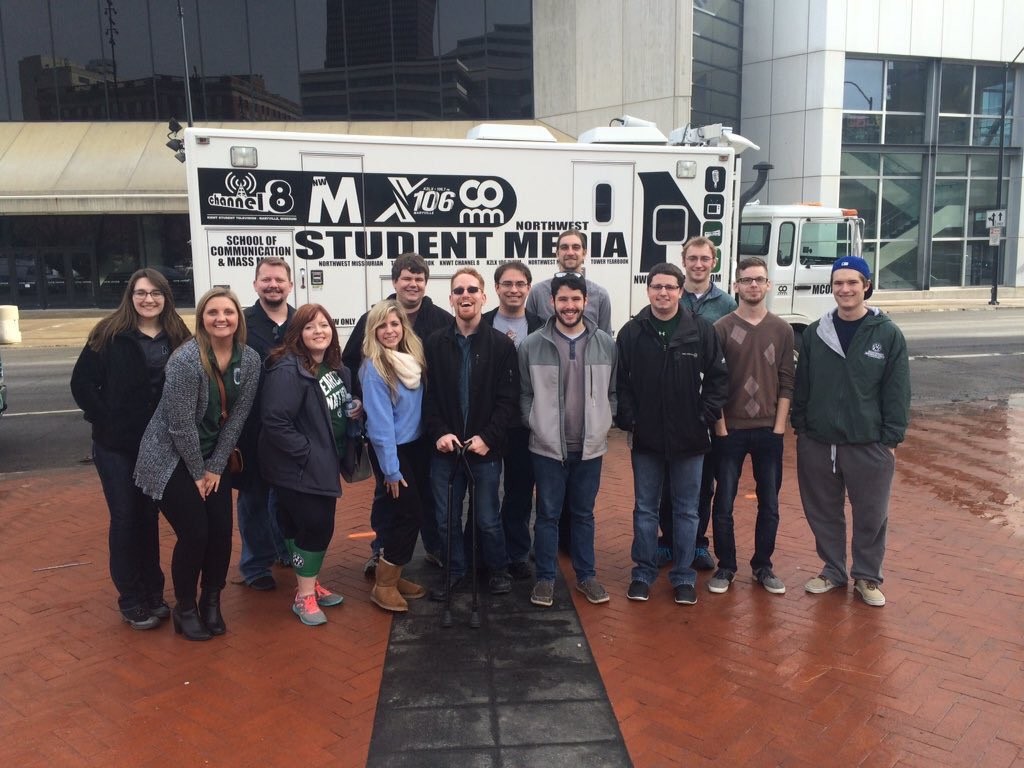Reporting stories for national, regional and college media
While voters trek to the polls in New Hampshire today, college media advisers from Missouri and Oklahoma reflect on the efforts of students in covering last week’s Iowa caucuses.

Northwest Missouri State University students, Steven Chappell go to Iowa
Steven Chappell, director of student publications and multimedia instructor at Northwest Missouri State University, and his political journalism class saw the Iowa caucuses up close and personal—as in covering and producing stories for the campus media at Northwest Missouri, located in Maryville.
A university grant helped cover transportation, lodging and other expenses, he said.
To see the students’ work, here are links Chappell provided:
- This link: https://www.youtube.com/channel/UCm0faj6jUBbJbcwoY5sEfjA connects to our video packages on YouTube.
- This link: http://www.nwmissourinews.com/news/politics/?refresh004 connects to our Missourian newspaper coverage
- The KNWT Facebook page, https://www.facebook.com/WatchChannelEightNews/
- The hashtags: #NWCaucus and #NWPolitics were used for all of our Twitter coverage.
Oklahoma students cover Iowa caucuses
The University of Oklahoma Gaylord College of Journalism and Mass Communication sent 14 students to cover the Iowa caucuses, according to John Schmeltzer, professor and Engleman/Livermore chair in Community Journalism.
“They were there from Jan. 17 and returned to campus on Feb. 2. All the stories have revolved around the millennial involvement in this year’s election,” Schmeltzer said in an e-mail.
“They wrote 24 stories for the Huffington Post, produced 14 broadcast packages that aired on KOCO News 5, the ABC outlet in Oklahoma City; 2 packages and a Skype interview that aired on KWTV News 9, the CBS outlet in Oklahoma City; 5 radio interviews that aired on ‘Mitchell in the Morning’ that aired on KOKC AM in Oklahoma City; and two packages that aired on the OKC Telemundo outlet Channel 30. In addition all the content has been posted to the college’s online magazine, Oklahoma Routes, at okroutes.com, and the website for the college’s daily newscast, OU Nightly. The only planned part of this effort was the sharing of content with Huffington Post and the college’s online magazine and broadcast website,” he added.
On upcoming primaries University of Oklahoma students will cover, Schmeltzer said: “Last Thursday, Feb. 3, we dispatched a one-man band reporter to New Hampshire to cover for both text and broadcast that state’s battle for the nomination. She was interviewed this morning about what she saw and experienced on KOKC. We will be sending two students to South Carolina for the Republican primary on Feb. 20 and two more to that state’s Democratic primary on Feb. 27. We will culminate our caucus/primary coverage on March 1, when we blitz Oklahoma and Texas with 30 reporters, two of the 14 states holding primaries or caucuses on Super Tuesday.”
Coverage will wrap up, Schmeltzer said, with an end-of-semester package of stories delving into the impact the nation’s millennials will have on November’s general election and a special report for OETA, the PBS outlet for the state of Oklahoma.
A brown bag lunch on the University of Oklahoma campus is planned this week, Scmeltzer said, when students “will talk with their peers about what they learned, saw and experienced.”
Links Schmeltzer provided samples of the students’ work: “Stories about what we were doing have appeared twice in the Oklahoman, papers across the region, and on the home page of the University of Oklahoma.” Below is a link to Sunday’s story:
